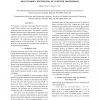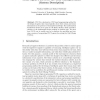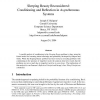1634 search results - page 128 / 327 » Reasoning about Knowledge Using Rough Sets |
ICIP
1995
IEEE
14 years 2 months ago
1995
IEEE
We introduce a projection based multi-channel restoration method which is useful in cases for which there is no a priori information about the input signal. The method is especial...
CLIMA
2006
14 years 1 days ago
2006
FLUX is a declarative, CLP-based programming method for the design of agents that reason logically about their actions and sensor information in the presence of incomplete knowledg...
CORR
2004
Springer
13 years 10 months ago
2004
Springer
A careful analysis of conditioning in the Sleeping Beauty problem is done, using the formal model for reasoning about knowledge and probability developed by Halpern and Tuttle. Wh...
IEAAIE
2000
Springer
14 years 2 months ago
2000
Springer
Enabling a domain expert to maintain his own knowledge in a Knowledge Based System has long been an ideal for the Knowledge Engineering community. In this paper we report on our ex...
IJCAI
2007
14 years 2 days ago
2007
We present a fully connectionist system for the learning of first-order logic programs and the generation of corresponding models: Given a program and a set of training examples,...



